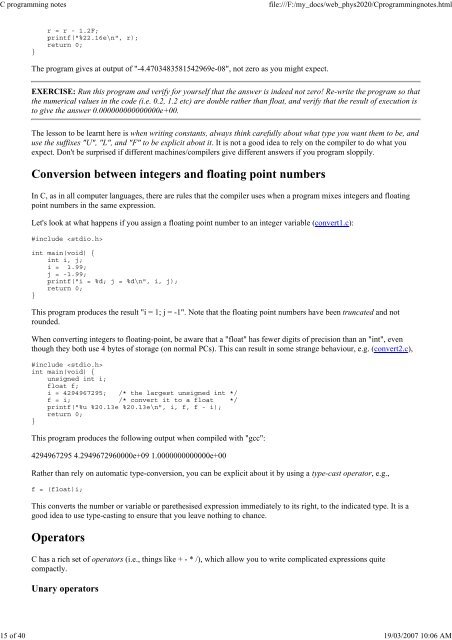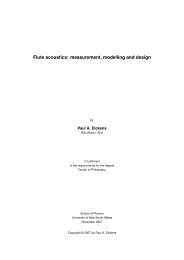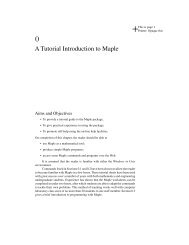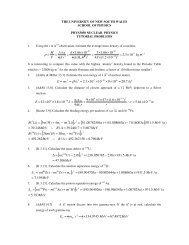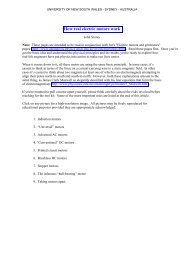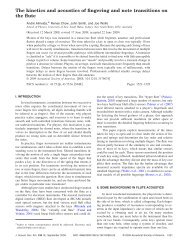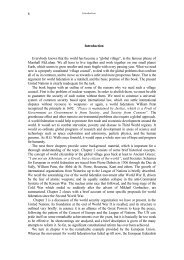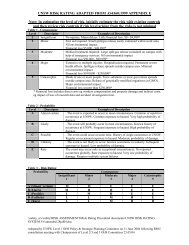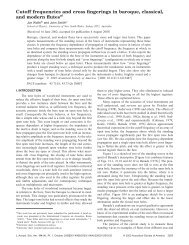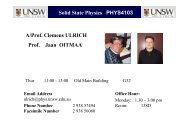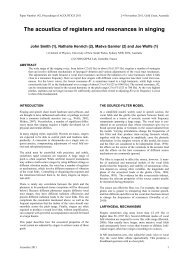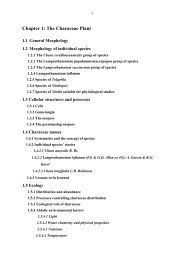C programming notes - School of Physics
C programming notes - School of Physics
C programming notes - School of Physics
Create successful ePaper yourself
Turn your PDF publications into a flip-book with our unique Google optimized e-Paper software.
C <strong>programming</strong> <strong>notes</strong><br />
file:///F:/my_docs/web_phys2020/C<strong>programming</strong><strong>notes</strong>.html<br />
15 <strong>of</strong> 40 19/03/2007 10:06 AM<br />
}<br />
r = r - 1.2F;<br />
printf("%22.16e\n", r);<br />
return 0;<br />
The program gives at output <strong>of</strong> "-4.4703483581542969e-08", not zero as you might expect.<br />
EXERCISE: Run this program and verify for yourself that the answer is indeed not zero! Re-write the program so that<br />
the numerical values in the code (i.e. 0.2, 1.2 etc) are double rather than float, and verify that the result <strong>of</strong> execution is<br />
to give the answer 0.000000000000000e+00.<br />
The lesson to be learnt here is when writing constants, always think carefully about what type you want them to be, and<br />
use the suffixes "U", "L", and "F" to be explicit about it. It is not a good idea to rely on the compiler to do what you<br />
expect. Don't be surprised if different machines/compilers give different answers if you program sloppily.<br />
Conversion between integers and floating point numbers<br />
In C, as in all computer languages, there are rules that the compiler uses when a program mixes integers and floating<br />
point numbers in the same expression.<br />
Let's look at what happens if you assign a floating point number to an integer variable (convert1.c):<br />
#include <br />
int main(void) {<br />
int i, j;<br />
i = 1.99;<br />
j = -1.99;<br />
printf("i = %d; j = %d\n", i, j);<br />
return 0;<br />
}<br />
This program produces the result "i = 1; j = -1". Note that the floating point numbers have been truncated and not<br />
rounded.<br />
When converting integers to floating-point, be aware that a "float" has fewer digits <strong>of</strong> precision than an "int", even<br />
though they both use 4 bytes <strong>of</strong> storage (on normal PCs). This can result in some strange behaviour, e.g. (convert2.c),<br />
#include <br />
int main(void) {<br />
unsigned int i;<br />
float f;<br />
i = 4294967295; /* the largest unsigned int */<br />
f = i; /* convert it to a float */<br />
printf("%u %20.13e %20.13e\n", i, f, f - i);<br />
return 0;<br />
}<br />
This program produces the following output when compiled with "gcc":<br />
4294967295 4.2949672960000e+09 1.0000000000000e+00<br />
Rather than rely on automatic type-conversion, you can be explicit about it by using a type-cast operator, e.g.,<br />
f = (float)i;<br />
This converts the number or variable or parethesised expression immediately to its right, to the indicated type. It is a<br />
good idea to use type-casting to ensure that you leave nothing to chance.<br />
Operators<br />
C has a rich set <strong>of</strong> operators (i.e., things like + - * /), which allow you to write complicated expressions quite<br />
compactly.<br />
Unary operators


